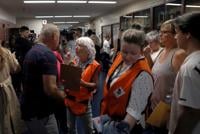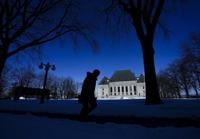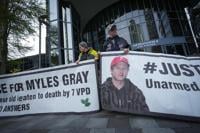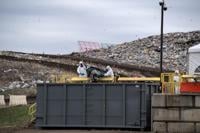A wildfire moving down the mountain toward Wilson's Landing, B.C., made an "unearthly" howling sound as it stirred up winds to become a "self-feeding beast," said the fire chief of the community on the western shore of Okanagan Lake.
Paul Zydowicz said his team had been monitoring the blaze and helping residents of nearby Traders Cove reduce fire risks around their homes, but once the flames crested the mountain and began burning downslope, they knew it was a "done deal."
The firefighters waited in Traders Cove until the "ember showers" started around 7 p.m. on Aug. 17, "and then it just exploded," he said in an interview Saturday.
"As the fire activity became unbearable, we would pull back, and as the fire front blew through, we would go back in," he said of their strategy.
"We basically allow for the worst of it to come through and then we come back in and try and save as much as possible."
Zydowicz is among 13 of 24 members of the Wilson's Landing Fire Department who had lost their own homes by the time the blaze subsided, he said.
He and his wife plan to rebuild on their property and most of his crew members have expressed similar desires, although he said some may choose to leave the community that fluctuates between 500 and 1,500 residents throughout the year.
The fire chief said two members of his team were injured battling the fast-moving blaze — one suffering second degree burns to his face while the other has a fractured wrist — but they wanted to get back to work as soon as possible.
"I always knew they were amazing," he said of his team.
"But now it's being displayed for everyone, how much integrity and dedication to this job this fire department has, and other departments also."
Zydowicz said support from the community has kept the firefighters going.
"We went to a call and came back to having nothing," he said.
"You don't really understand that you don't have anything until you go, 'Okay, well I'm gonna go get changed, but I have no clothes to change into.'"
The Kelowna-based charity Mamas for Mamas stepped up to provide basic necessities, he said, and further donations have followed.
Zydowicz said his message to his team is that they will be OK.
"We have a portion of the community that has not been destroyed. It's a lot easier to rebuild when you have neighbours," he said.
"We have an incredible community spirit ... We just have to be resilient."
In nearby West Kelowna, B.C., Fire Chief Jason Brolund told a briefing that "it's all about emotions" as firefighters and residents begin to process the devastation.
Brolund said he and his crews are "gutted by the losses" of more than 170 homes in his community and others on the shores of Okanagan Lake.
But he said they're starting to breathe "a collective sigh, although very cautiously," given the hot, sunny weather in the forecast for the province's southern Interior.
"We're not letting our guard down," he said Saturday.
Community support has been like "fuel" for his crews, he said, from children stopping by with encouraging signs to the meals being prepared for firefighters.
About 900 people from West Kelowna were allowed to return home on Friday, he said, though active firefighting continues and many remain on evacuation orders.
Orders have rescinded for some on Westbank First Nation lands, while residents of just over 400 properties in the District of Lake Country, on the opposite side of Okanagan Lake, were also allowed to return home Saturday afternoon.
The B.C. government, meanwhile, issued a statement saying mental health supports are available for those affected by wildfires, with disaster psychological support workers deployed to emergency reception centres throughout the Interior.
The McDougall Creek wildfire, responsible for much of the destruction in the West Kelowna area, continues to burn out of control. The blaze has scorched about 123 square kilometres of land since being discovered on Aug. 15.
Emergency authorities have continued to warn boaters to stay off Okanagan Lake in the section between the William R. Bennett Bridge and Fintry Provincial Park to accommodate firefighting aircraft that may make use of the water.
To the north, officials with the Columbia Shuswap Regional District have said the Bush Creek East wildfire has destroyed more than 130 structures and damaged almost 40 more, as crews continue to battle the 430-square-kilometre blaze.
An evacuation order for the Sorrento area has been downgraded, allowing residents of more than 800 properties to return home, although Tracy Hughes, an information officer with the district, said they must remain prepared to leave on short notice.
Larry Read, the communications coordinator for neighbouring Skwlax te Secwepemculecw, said it had been a "very traumatic" week for the community.
Read provided an update on losses, saying 85 structures have been destroyed, while 13 have been partially damaged and 139 did not sustain any damage.
A committee is set to gather this week to begin the planning process for people to return to homes that survived and to rebuild those that did not, he said.
Mike McCulley, an information officer with the BC Wildfire Service, told a briefing Saturday that it had been relatively quiet in terms of fire growth and there's no major wind in the forecast for the coming days — but conditions are hot and dry.
"We're seeing fire burn differently than we normally do. We're seeing it burn deep into the ground, we're seeing the trees compromised in ways they normally aren't," he said. "What that means is we have to proceed with extreme caution."
This report by ´şÉ«Ö±˛Ąwas first published Aug. 26, 2023.










































